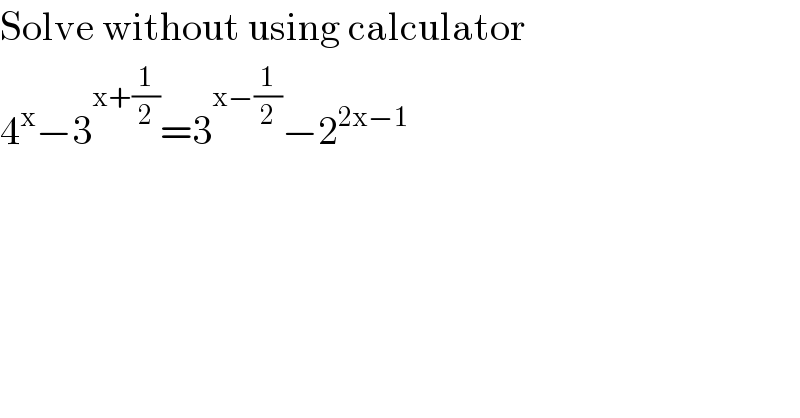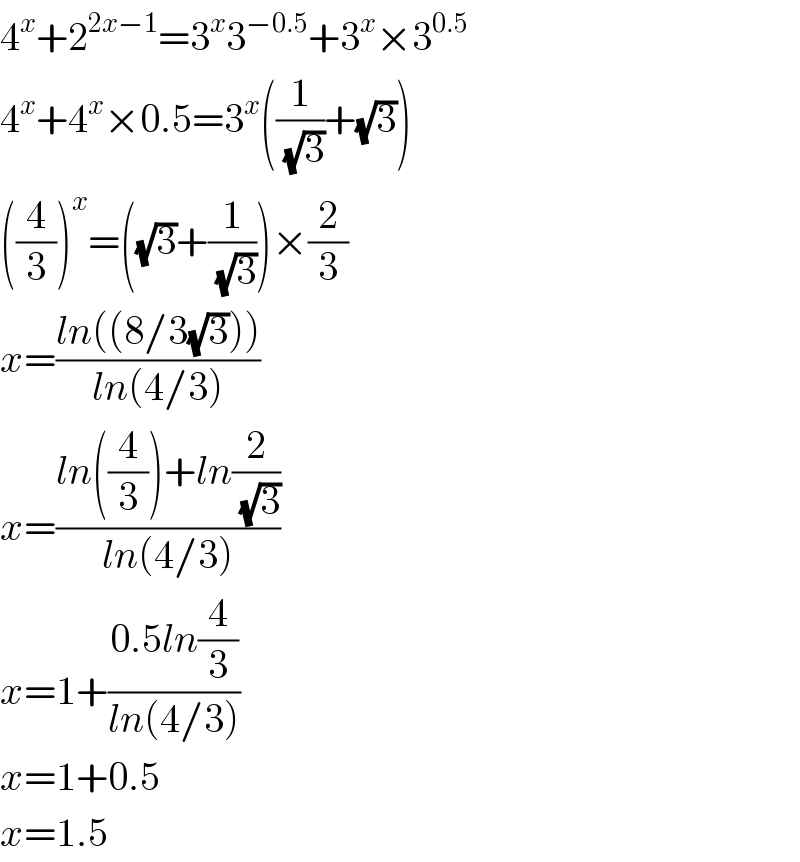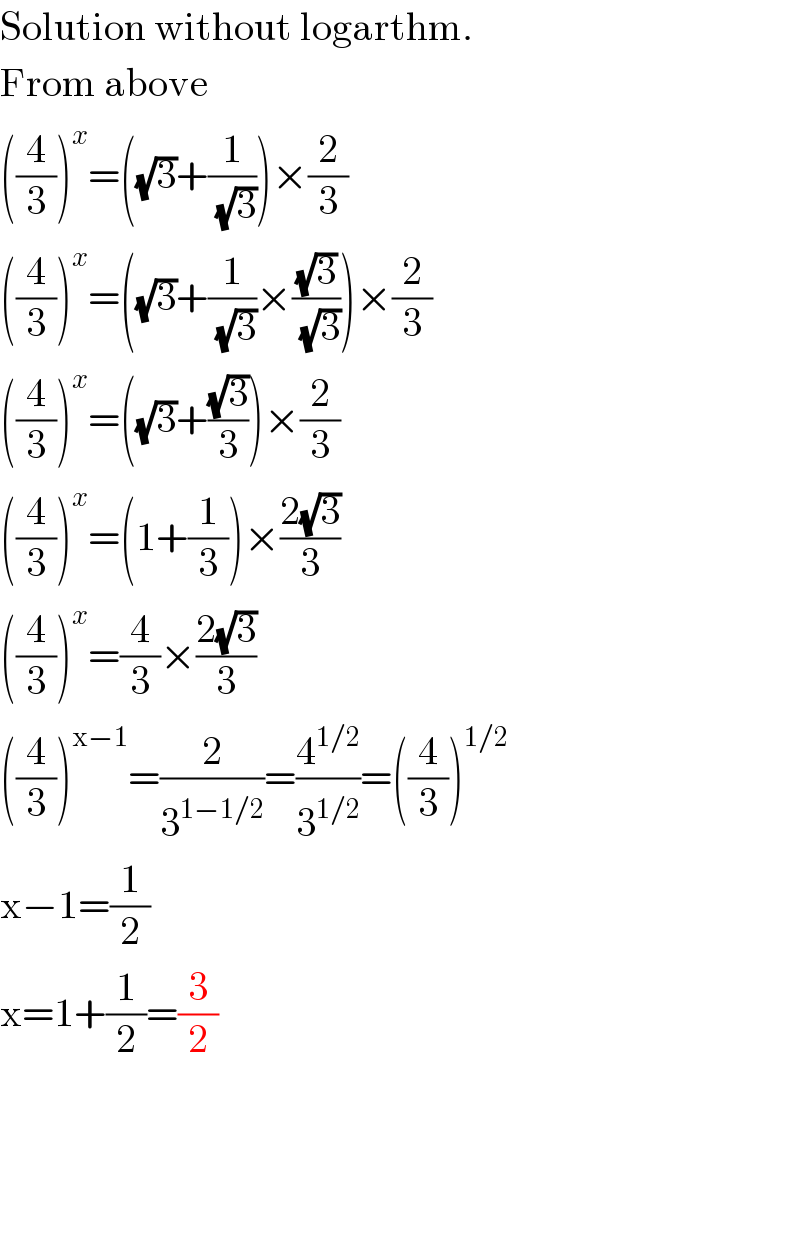Question Number 5568 by Rasheed Soomro last updated on 20/May/16

$$\mathrm{Solve}\:\mathrm{without}\:\mathrm{using}\:\mathrm{calculator} \\ $$$$\mathrm{4}^{\mathrm{x}} −\mathrm{3}^{\mathrm{x}+\frac{\mathrm{1}}{\mathrm{2}}} =\mathrm{3}^{\mathrm{x}−\frac{\mathrm{1}}{\mathrm{2}}} −\mathrm{2}^{\mathrm{2x}−\mathrm{1}} \\ $$
Answered by Yozzii last updated on 20/May/16

$$\mathrm{4}^{{x}} +\mathrm{2}^{\mathrm{2}{x}−\mathrm{1}} =\mathrm{3}^{{x}} \mathrm{3}^{−\mathrm{0}.\mathrm{5}} +\mathrm{3}^{{x}} ×\mathrm{3}^{\mathrm{0}.\mathrm{5}} \\ $$$$\mathrm{4}^{{x}} +\mathrm{4}^{{x}} ×\mathrm{0}.\mathrm{5}=\mathrm{3}^{{x}} \left(\frac{\mathrm{1}}{\:\sqrt{\mathrm{3}}}+\sqrt{\mathrm{3}}\right) \\ $$$$\left(\frac{\mathrm{4}}{\mathrm{3}}\right)^{{x}} =\left(\sqrt{\mathrm{3}}+\frac{\mathrm{1}}{\:\sqrt{\mathrm{3}}}\right)×\frac{\mathrm{2}}{\mathrm{3}} \\ $$$${x}=\frac{{ln}\left(\left(\mathrm{8}/\mathrm{3}\sqrt{\mathrm{3}}\right)\right)}{{ln}\left(\mathrm{4}/\mathrm{3}\right)} \\ $$$${x}=\frac{{ln}\left(\frac{\mathrm{4}}{\mathrm{3}}\right)+{ln}\frac{\mathrm{2}}{\:\sqrt{\mathrm{3}}}}{{ln}\left(\mathrm{4}/\mathrm{3}\right)} \\ $$$${x}=\mathrm{1}+\frac{\mathrm{0}.\mathrm{5}{ln}\frac{\mathrm{4}}{\mathrm{3}}}{{ln}\left(\mathrm{4}/\mathrm{3}\right)} \\ $$$${x}=\mathrm{1}+\mathrm{0}.\mathrm{5} \\ $$$${x}=\mathrm{1}.\mathrm{5} \\ $$
Commented by Rasheed Soomro last updated on 21/May/16

$$\mathrm{Solution}\:\mathrm{without}\:\mathrm{logarthm}. \\ $$$$\mathrm{From}\:\mathrm{above} \\ $$$$\left(\frac{\mathrm{4}}{\mathrm{3}}\right)^{{x}} =\left(\sqrt{\mathrm{3}}+\frac{\mathrm{1}}{\:\sqrt{\mathrm{3}}}\right)×\frac{\mathrm{2}}{\mathrm{3}} \\ $$$$\left(\frac{\mathrm{4}}{\mathrm{3}}\right)^{{x}} =\left(\sqrt{\mathrm{3}}+\frac{\mathrm{1}}{\:\sqrt{\mathrm{3}}}×\frac{\sqrt{\mathrm{3}}}{\:\sqrt{\mathrm{3}}}\right)×\frac{\mathrm{2}}{\mathrm{3}} \\ $$$$\left(\frac{\mathrm{4}}{\mathrm{3}}\right)^{{x}} =\left(\sqrt{\mathrm{3}}+\frac{\sqrt{\mathrm{3}}}{\mathrm{3}}\right)×\frac{\mathrm{2}}{\mathrm{3}} \\ $$$$\left(\frac{\mathrm{4}}{\mathrm{3}}\right)^{{x}} =\left(\mathrm{1}+\frac{\mathrm{1}}{\mathrm{3}}\right)×\frac{\mathrm{2}\sqrt{\mathrm{3}}}{\mathrm{3}} \\ $$$$\left(\frac{\mathrm{4}}{\mathrm{3}}\right)^{{x}} =\frac{\mathrm{4}}{\mathrm{3}}×\frac{\mathrm{2}\sqrt{\mathrm{3}}}{\mathrm{3}} \\ $$$$\left(\frac{\mathrm{4}}{\mathrm{3}}\right)^{\mathrm{x}−\mathrm{1}} =\frac{\mathrm{2}}{\mathrm{3}^{\mathrm{1}−\mathrm{1}/\mathrm{2}} }=\frac{\mathrm{4}^{\mathrm{1}/\mathrm{2}} }{\mathrm{3}^{\mathrm{1}/\mathrm{2}} }=\left(\frac{\mathrm{4}}{\mathrm{3}}\right)^{\mathrm{1}/\mathrm{2}} \\ $$$$\mathrm{x}−\mathrm{1}=\frac{\mathrm{1}}{\mathrm{2}} \\ $$$$\mathrm{x}=\mathrm{1}+\frac{\mathrm{1}}{\mathrm{2}}=\frac{\mathrm{3}}{\mathrm{2}} \\ $$$$ \\ $$$$ \\ $$$$ \\ $$
Commented by Yozzii last updated on 20/May/16

$${Made}\:{an}\:{error}.\:{Sorry}\sqrt{} \\ $$
